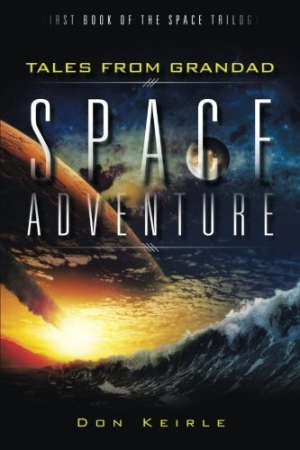It looks like you've stumbled upon a page meant to be read by our code instead of viewed directly. You're probably looking for this page.
Space Adventure
Tales from Grandad
This is an individual’s view of humanity’s grandiose and ambitious adventures in space, in which planets are discovered and human beings grapple with their place in the universe.
An old man pens a detailed chronicle of humanity’s expansion into space in Don Keirle’s ambitious Space Adventure.
In the early days of space travel, Grandad, a retired electrical engineer, decides to scour historical documents and present the layman’s point of view of the first space explorers. He pens a journal-like story of people who seem destined to become legends—personalities including the Prof, Whistler, and his own granddaughter.
Grandad’s journals chronicle humanity’s journey to distant planets, establishing colonies, studying new life, and even foiling a potential terrorist plot against Earth.
Grandad is an interesting choice for a narrator. He’s educated, but not in the aspect of the burgeoning science of space travel and exploration. This leads to pauses in the story as he explains events, concepts, and important characters in basic terms. He becomes more a part of the story through his connection to his granddaughter, Catherine, an increasingly important character in her own right.
Because of its massive scope, the book could easily have spiraled and sagged under the weight of too many events. But because the spotlight stays on a small cast of characters, the story stays trim. Almost all the major characters are introduced early on, and the story follows them as they play important roles in establishing new science, politics, and relationships. This narrow focus keeps the flow on an even keel.
Typos and formatting issues make for rough reading. Dialogue is hard to follow, particularly because characters often have multiple versions of their names in addition to aliases (Whistler is, variously, The Whistler, Whistler, and James Whistler, and the story eventually includes his grandson as well).
Though this is a character-focused take on space exploration, characterization is minimal. The cast is hard to distinguish from one another, even when they are named. Roles shift inexplicably; Whistler, the primary adversary, is revealed as not actually evil, and a new antagonist emerges in the form of a previously innocent character. Such shifts happen without foreshadowing and are a hard sell. Even Grandad is dimensionless, and his story is pushed aside without much consequence when Catherine takes the stage.
Inconsistency is a major obstacle. The book starts out as Grandad’s journals, but then shifts to include an omniscient narrator’s voice, and randomly switches back to the journal format when Grandad wants to interject. This becomes increasingly confusing, especially as secondary characters speak in the first person, Catherine takes over the journals, and Grandad becomes a character in Catherine’s own writing.
Space Adventure is the first book in a trilogy centered on an individual’s view of humanity’s grandiose and ambitious adventures in space. Planets are discovered, human beings grapple with their place in the universe, and, on a smaller scale, people grow together and apart in typical fashion.
Reviewed by
John M. Murray
Disclosure: This article is not an endorsement, but a review. The publisher of this book provided free copies of the book and paid a small fee to have their book reviewed by a professional reviewer. Foreword Reviews and Clarion Reviews make no guarantee that the publisher will receive a positive review. Foreword Magazine, Inc. is disclosing this in accordance with the Federal Trade Commission’s 16 CFR, Part 255.
